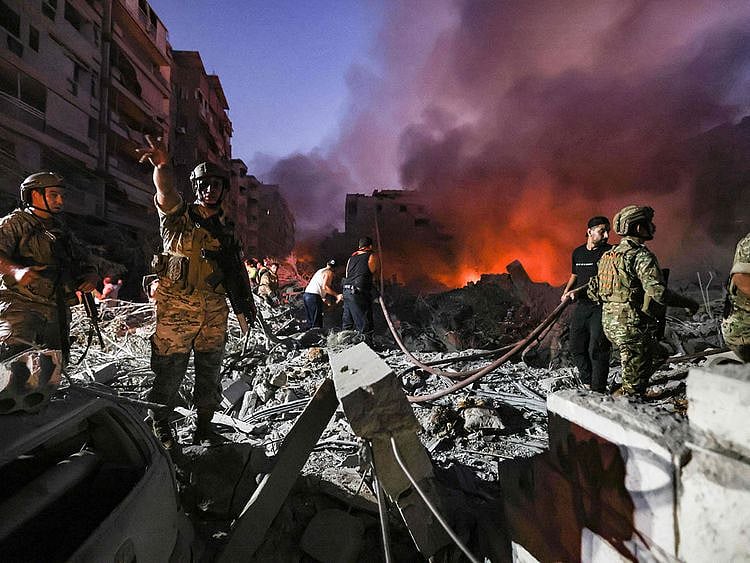Why Israel must respect multilateralism
Nentanyahu must realise that lasting peace comes through diplomacy, not military action

The Israeli-Lebanese conflict has once again brought the world to a critical juncture, reminding us of the fragility of peace and the importance of collective diplomacy. As violence escalates along the Israel-Lebanon border and in Gaza, Israel continues its military strikes on Hezbollah strongholds, even after assassinating Hassan Nasrallah, and indiscriminately bombards civilian areas while planning a land incursion.
This approach, far from guaranteeing security, exacerbates regional tensions and undermines global efforts to restore peace. In this volatile moment, it is imperative that Israel rethinks its unilateral actions and embraces multilateralism.
For decades, the Israeli-Lebanese conflict has been marked by sporadic violence, deeply rooted political instability, and the involvement of Hezbollah, a powerful non-state actor backed by Iran. Israel regards Hezbollah as a terrorist organisation.
The conflict is emblematic of the broader instability in the Middle East, a region shaped by proxy wars, territorial disputes, and external influences from global powers vying for strategic control. Yet, the conflict is no longer just a localised issue; it is now a test of whether the international community can respond effectively to the growing divisions that threaten world peace.
The recent 79th session of the United Nations General Assembly (UNGA) placed the Israeli-Lebanese conflict squarely on the global diplomatic agenda. In a rare moment of unity, countries such as the United States, France, the UAE, Saudi Arabia, Qatar, Japan, and Germany called for an immediate 21-day ceasefire.
This collective demand highlights the urgent need for diplomacy to curb escalating violence, yet Israel remains unwilling to compromise.
A diplomatic solution
Israel’s reluctance to engage meaningfully with international efforts for peace is dangerous. Unilateral actions, such as continued military strikes on civilian areas and targeted killing of Hamas and Hezbollah leadership, deepen divisions rather than bridge them.
History has shown that such strategies rarely lead to lasting peace; instead, they perpetuate cycles of violence that harm both Palestinians and Israelis. If Israel is truly committed to securing long-term peace, it must acknowledge the importance of multilateral diplomacy and engage with the global community to foster a diplomatic solution that respects the safety and rights of all parties involved.
The consequences of ignoring multilateralism extend beyond immediate security concerns. Secretary-General António Guterres warned that “hell is breaking loose in Lebanon,” and his statement underscores the severity of the humanitarian crisis exacerbated by Israel’s military actions.
The destruction of civilian infrastructure, the loss of homes, and the decimation of public utilities only fuel further desperation and anger. Continued military aggression threatens to draw the region into a wider conflict, destabilising not just Lebanon but the entire Middle East.
In this context, multilateral frameworks, particularly through the UN, offer the best path forward. The UN, despite its imperfections, remains the most effective platform for resolving complex conflicts that involve multiple state and non-state actors.
A two-state solution
The international community has long pursued a two-state solution as a cornerstone of peace in the region, and this remains a viable path forward. However, such a solution will remain elusive unless Israel commits to collective dialogue and mutual compromise.
Unilateral actions not only violate international humanitarian law but also erode Israel’s standing in the international community and diminish the credibility of institutions designed to mediate such crises.
The recently adopted “Pact for the Future” at the UNGA is a step toward restoring faith in multilateralism. The pact aims to reinvigorate the UN’s capacity to address interconnected global crises — ranging from geopolitical tensions to climate change and health threats.
Its underlying message is clear: no one nation can tackle these challenges alone. Multilateralism, which emphasises collective responsibility and decision-making, is the only way forward in an increasingly polarised world. Yet, the success of this framework depends on nations like Israel recognising its value.
Israel’s continued defiance of international calls for a ceasefire risks triggering a larger regional conflict that could draw in more global powers. This not only threatens regional stability but also global security. The Middle East, with its complex web of alliances and enmities, cannot be viewed in isolation from broader geopolitical dynamics. Further escalation in Lebanon and Gaza could have far-reaching consequences, jeopardising millions of lives and derailing global peace efforts.
Many argue that multilateral institutions like the UN have lost their relevance, often paralysed by the vetoes of major powers or bogged down in bureaucratic processes. While these criticisms are not unfounded, abandoning multilateralism in favour of unilateral actions would be a grave mistake.
High political stakes
The solution to the Israeli-Lebanese conflict — and the broader Israeli-Palestinian issue — lies in reforming, not discarding, multilateral diplomacy. As flawed as the system may be, it remains the best platform for nations to resolve disputes without recourse to violence.
The international community, particularly Israel’s allies, must take a more active role in promoting peace. Nations like the United States and key European powers, which have long provided diplomatic cover for Israel, must now leverage their influence to push for compliance with international law.
Continued political and military support without accountability risks enabling further atrocities and eroding the legitimacy of international governance. The International Court of Justice’s recent ruling, which underscores the need for Israel to adhere to international humanitarian law, is not optional — it is a legal and moral obligation.
Tel Aviv must recognise that multilateral diplomacy, not unilateral military action, offers the best path to lasting peace. The calls for a ceasefire from leading nations cannot be ignored, and Israel’s failure to engage constructively risks not only further violence but also global isolation.
The world is at a crossroads: we can either allow the cycle of violence to continue, destabilising both the Middle East and global peace efforts, or we can recommit to multilateralism as a means to achieve enduring peace.
Network Links
GN StoreDownload our app
© Al Nisr Publishing LLC 2026. All rights reserved.